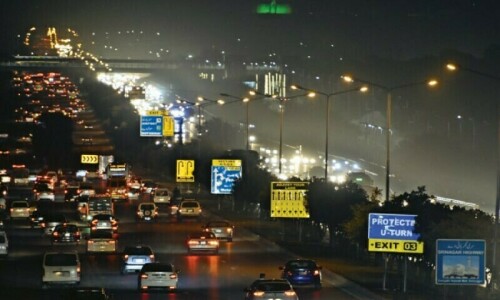
Qaisra Shahraz is a British Pakistani novelist and screenwriter. Her first novel, The Holy Woman, was published in 2001 and garnered critical acclaim.
Ms Shahraz’ stories revolve around strong women who are made to conform to the patriarchal rules set down by Pakistani culture but still manage to live life on their own terms.
Dawn caught up with Ms Shahraz at the Islamabad Literature Festival and spoke to her about her novels and other interests.
Q: What are the problems you face as a storyteller? Do you get writers’ block?
A: I am far too busy to get writers block. I have so much to do that when I sit down to write, I have to get something down on paper. Whether it is good or bad is another matter, as long as I have something down on paper that I can improve later.
What I do struggle with is social media. It is such a huge distraction. I will be sitting down to write and I will think, ‘Oh let me check my Facebook’ and from there I get busy checking other social media accounts as well and end up wasting time.
Q: How did you develop an interest in promoting inter-faith harmony?
A: I believe in using literature to promote peace and that writers are the ambassadors of promoting peace. When I am on literary tours, I like to think I am spreading a message of peace and tolerance.
On my tour to Germany, where there is a lot of Islamophobia, I told the audience that I am a proud Muslim and said that this is what an ordinary Muslim is like and that the majority of Muslims are peace loving and do not want to harm others.
I am currently a trustee of the Manchester Multi Faith Centre and vice chair of the Faith Network 4 Manchester and a member of the Muslim-Jewish Forum.
Q: There is an assumption that writing for women needs to be more emotional and that writing for men can be more technical and needs to be more thrilling. Do you agree with that?
A: I think this is a generalisation. There is some truth to this and there isn’t. People write about what they know best. But who decides which is more important? Who is there to say writing about emotions is less important because this has to do with the inside world?
I can write about life in Pakistan because I know it, I cannot write about Indonesia because I have never been there.
I write about women because I understand them better. There are men in my books as well, but fewer. And I feel it is easier to get inside the mind of a woman. So if that is the case, then yes, we do end up writing more about emotion and women. But that doesn’t mean we cannot write about men. Similarly, many male writers have a woman for their lead character.
On the other hand, we cannot make a generalised statement, saying women write about emotions and men don’t. As a writer you are supposed to invent, create and research and if you are good at all those things, there is no difficulty in creating credible characters in literature.
Q: You are also a screen writer. Do you write for theatre as well?
A: I do write for theatre. I wrote a play called Mehmood’s Wedding, but I never really pursued it. Theatres have a smaller audience and I believe they are a bit elitist. Drama serials on the other hand, can be watched by everyone.
Why do you think I write serials for the Pakistani audience? It is because I know that not a lot of people will be reading my book and not many will be able to afford it either. An added barrier is that not many people in the country can read English.
And those who read my books, the educated middle and elite class, don’t really need to be taught the lessons I want to teach.
The poorer, less uneducated people are the ones I want to teach about education and equality etc. For me drama is the medium though which I can speak to the people.
Published in Dawn, April 21st, 2016














































Dear visitor, the comments section is undergoing an overhaul and will return soon.